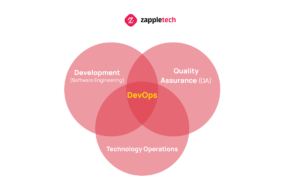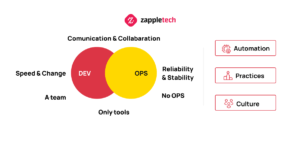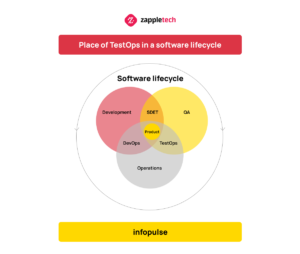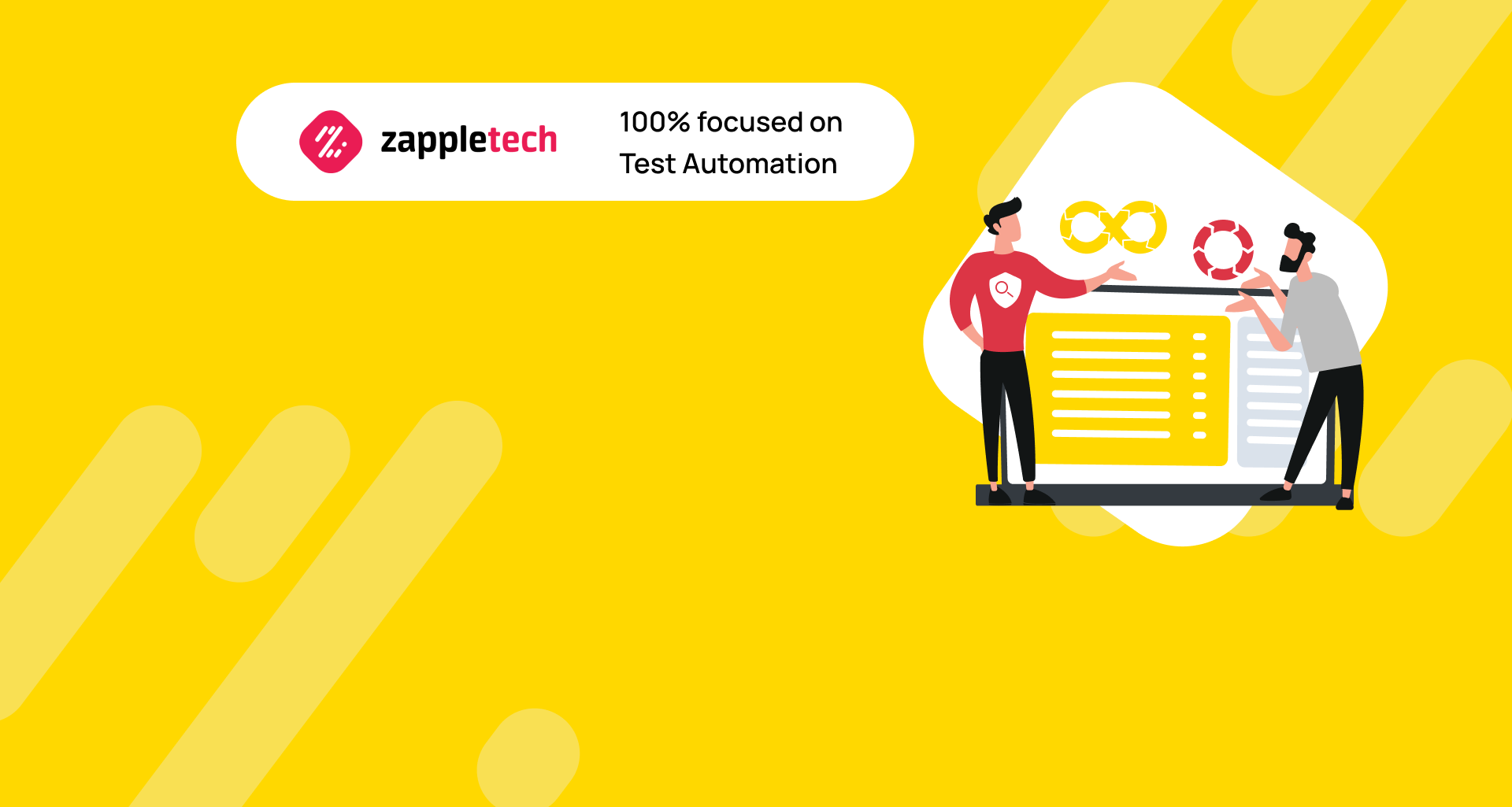The software development process cannot be complete without effective testing and prompt error response. As developers face increasingly complex tasks, there is a growing need for more advanced tools and methods. Over a decade ago, the IT industry introduced DevOps, a methodology designed to streamline development and bring order to the chaos. While DevOps brought many advantages, it has also shown some limitations when dealing with particularly complex challenges, especially in testing environments.
In a DevOps workflow, aim to shift left by incorporating automated tests in the early stages of development. This helps identify issues sooner, reducing delays and enhancing the overall quality of the release.Mikhail BodnarchukCDO, ZappleTech Inc.
This is where DevOps for testers plays a crucial role. By incorporating specialized testing frameworks within the DevOps pipeline, testers can ensure more efficient error detection and continuous feedback, contributing to the overall agility of the development cycle. However, as software complexity continues to increase, TestOps has emerged as an essential complement to DevOps.
TestOps fosters seamless collaboration between Quality Assurance (QA), Development, and Operations teams, refining the development process and ensuring the delivery of high-quality software. It serves as a direct response to the limitations of traditional DevOps, emphasizing the importance of continuous testing, automation, and resilient error handling. DevOps for testers, integrated with TestOps, sets the stage for a more efficient and comprehensive approach to modern software development, particularly in handling complex projects that require meticulous testing at every phase.
Table of Contents
From DevOps to TestOps

To begin with, let’s talk about DevOps: what is its essence, what is it, and what opportunities and limitations it brings. DevOps is a concept that is often misunderstood today. Many people may think of it as merely a set of tools and software, but it’s much more than that.
DevOps for testers, in particular, emphasizes the integration of testing into every phase of the software development lifecycle. This means that testing is no longer a separate phase but an ongoing process that ensures continuous quality. DevOps testing services encompass a wide range of tools, services, policies, and management practices aimed at delivering a reliable product efficiently.
At its core, DevOps merges the expertise of system administrators, operations engineers, and developers. This collaboration ensures that software testing, monitoring, continuous integration, and accountability are maintained throughout the development process. However, DevOps tends to be reactive, responding to issues as they arise. This is why incorporating DevOps for testers into the workflow is so critical. Testers play an essential role in identifying potential issues early, ensuring that the software is continuously tested and validated.
DevOps relies heavily on automated testing, accountability, and often a CI/CD pipeline to streamline the deployment process. By integrating DevOps for testers, you enhance the proactive identification of bugs and improve the overall quality of the product before release.
DevOps: What Is It, and What Is the Essence of This Approach

DevOps for testers plays a crucial role in addressing the issues often encountered in traditional software development approaches, especially those related to synchronization between teams. DevOps test automation provides an integrated solution that eliminates the bottlenecks caused by step-by-step development processes. This approach fosters better collaboration between departments, ensuring smoother and faster product development cycles. With automated testing in DevOps, testers can consistently validate new code changes, improving the overall efficiency and quality of the software. Additionally, it helps in bridging communication gaps, aligning the goals of development, operations, and testing teams seamlessly. DevOps testing services principles are as follows:
Automation of everything that can be automated.
Using the same software and settings by all departments.
Unified development, testing, and release environment.
The desire for a quick release and getting to the end-users.
So, all participants in creating the project, including analysts, and testers, work in a single environment, speeding up the product release several times.
What are the main functions of a DevOps Engineer?
Such a specialist provides full test automation, of testing and acceleration of development. He ensures this because:
Configuring servers and automatically managing their configurations.
Creating and configuring virtual containers for quick launch of the necessary software.
Automation of testing and other code components.
Collecting data to monitor the entire system.
Fixing all problems and violations in case any of the processes break down.
At the same time, developers are often forced to somehow supplement this approach with the help of TestOps.
Test Ops: Why Using DevOps is Not Enough
While DevOps has undoubtedly transformed software development by improving collaboration between development and operations, it doesn’t always address the specific needs of testers. DevOps is highly focused on streamlining deployment, infrastructure, and automation. However, when it comes to the testing process, DevOps for testers may lack the specialized capabilities needed to fully integrate testing activities into the broader CI/CD pipeline. This is where the concept of TestOps comes into play.
TestOps provides the necessary framework to enhance testing within the DevOps pipeline, focusing on test management, automation, and quality reporting. It ensures that testing is not an afterthought but an integral part of every stage of software development. Without TestOps, the testing process may become bottlenecked, lacking the agility and comprehensive oversight needed to keep up with the pace of DevOps.
By leveraging TestOps, teams can ensure that the testing phase is optimized for continuous integration and deployment, something that DevOps alone often overlooks. So while DevOps improves collaboration, using DevOps for testers with an additional TestOps layer ensures that testing remains robust, automated, and aligned with the goals of speed and quality in software delivery.
However, the fact is that technologies are constantly changing and improving and, accordingly, becoming more complicated. And today’s testing process includes many additional forms and factors:
Visual testing.
API testing.
Security testing.
Functional testing.
Here we face some problems, as long as all these are complex processes and their organization and implementation can take a long time. Not to mention additional problems for the developer.
Let’s also not forget that the tester has certain responsibilities, like testing and verifying the product. TestOps is responsible for using tools and defining technologies to implement some of the above types of unit testing.
TestOps is the optimization of all software development and testing processes. It connects continuous testing tools from all the disparateteams into a well-oiled mechanism and allows you to create better software.
It allows you to bring the product to release much faster and with even fewer errors.
TestOps Features
TestOps plays a crucial role in modern software development by integrating DevOps principles into the testing process, making it particularly valuable for QA teams. By combining DevOps for testers with TestOps features, testing becomes more efficient and continuous, helping teams stay aligned with the fast-paced release cycles that are common in today’s environment.
Effective communication between testers, developers, and operations teams is key. Use shared tools, dashboards, and regular feedback loops to ensure seamless integration of testing within the DevOps pipeline.Sergey AlmyashevCOO, ZappleTech Inc.
TestOps allows for the real-time monitoring of test scripts, ensuring that the performance of your production environment is tracked and optimized consistently. This feature is especially beneficial as it enables automated regression testing, reducing the risk of bugs making their way into live environments. Additionally, it supports better collaboration between testers and developers, making the testing process a seamless part of the overall development pipeline.
With TestOps features, teams can integrate multiple tools and frameworks, enhancing scalability and efficiency. Automated reporting and detailed analytics further assist testers in identifying bottlenecks, enabling faster issue resolution. Moreover, with DevOps for testers, the line between testing and operations is blurred, fostering a culture where quality is maintained throughout the entire software lifecycle.
Active Testing Instead of Reactive
Active testing, as emphasized in DevOps for testers, focuses on proactively identifying potential issues before they arise, rather than waiting for problems to surface. This approach, often referred to as Test Ops, uses automated tests to monitor and assess the production system in real time. By adopting this active methodology, testers can detect potential vulnerabilities or inefficiencies early on and address them immediately, reducing the risk of major failures in the future.
Though it sounds straightforward, the challenge lies in the fact that many automated tests are designed primarily to run in controlled local test environments, rather than on live production systems. In DevOps for testers, this active testing approach requires a shift in mindset, moving beyond the reactive testing phase to a more strategic and continuous integration of testing within the entire development pipeline. This ensures that testing is not just an afterthought but a critical component of the DevOps process, ensuring higher quality and reliability of the final product.
Testing With Real Options
In today’s fast-paced development environments, DevOps for testers plays a crucial role in ensuring smooth integration and delivery. The more complex a system becomes, the more essential it is to understand its multifactorial flows and interactions. For example, something as simple as a login feature might interact with Authentication, Authorization, and Accounting (AAA) services, extract user profiles from a database, and serve content to the homepage from external interfaces.
With Test Ops, you can create and manage test cases that simulate how the system behaves from the end-user’s perspective. By integrating automated tests within the DevOps pipeline, you’re not only verifying individual functionalities but also ensuring that you’re testing real-world scenarios and use cases. This approach bridges the gap between development and testing, allowing for a more reliable, faster feedback loop in complex systems. DevOps for testers enables more efficient workflows, driving quality and performance across the entire lifecycle.
TestOps Identifies What DevOps Doesn’t See
Integration
TestOps exists to ensure that the product development pipeline is equipped with the necessary testing environments and automated tools for streamlined quality assurance. Traditionally, quality control engineers have relied on pipelines created by the IT department, often with limited involvement in the process. This lack of integration has left gaps in addressing the specific needs of testing teams.
With the rise of DevOps for testers, TestOps is shifting the landscape by bringing DevOps-related testing activities under the purview of quality assurance engineers. This enables testers and developers to take full ownership of the development pipeline, allowing them to adapt and optimize it according to their unique requirements. This approach fosters better collaboration and integration between testing and development processes, ultimately enhancing the overall product quality.
TestOps vs. DevOps
TestOps and DevOps teams, while distinct in focus, indeed share common ground and can work in tandem to enhance the software development lifecycle.
DevOps encompasses the entirety of the software development lifecycle, overseeing seamless operations from development to testing tool deployment. It places paramount importance on the integrity and efficiency of these processes, ensuring a smooth operational flow.
On the other hand, TestOps concentrates on the testing aspect of this lifecycle, employing various automated testing methodologies to rigorously assess the software’s functionality and performance. It emphasizes the swift delivery of thoroughly tested code and fosters collaboration between QA, development, and operations teams. Moreover, TestOps adapts to the latest trends and practices in the ever-evolving landscape of software development.
In practical terms, TestOps automates the testing process, executing a battery of tests to verify the software’s reliability and functionality. Meanwhile, DevOps lays the groundwork load testing by providing a conducive environment for these tests to be conducted effectively.
In this symbiotic relationship, DevOps sets the stage for TestOps to thrive. The former establishes the infrastructure and operational framework, while the latter ensures that the software is rigorously tested within this environment. Together, they form a powerful alliance, streamlining the development process and delivering robust, reliable software to end-users. This collaborative effort ultimately leads to improved product quality, enhanced user satisfaction, and accelerated time-to-market.
How Can DevTestOps Help My Development?

As a rule, the division of labor increases efficiency, especially when we have a complex multi-factor system to work on. For example, we used to have physical servers. Testers and developers were forced to install everything manually. At the same time, we were forced to buy servers.
We have today: servers are easily available for rent, and you can transfer infrastructure tasks to the provider. No more OS installations — everything is available for delegating operations. So we got a significant simplification of tasks. But at the same time, we have significantly complicated the infrastructure.
Flexibility is achieved by increasing the number of configuration files, and sometimes it takes a lot of effort to find the causes of problems that users eventually encounter.
Thus, the current situation requires a specialist who, in addition to knowing the principles of testing and the market stack of technologies (databases, web services, programming language), also understands the overall structure of the product. That is, we need DevTestOps testers.
ZappleTech is a company that will help solve any problem related to development and testing. We know everything about testing methods, tools, and principles. Our case includes performance testing, collaboration with healthy projects, education, and other fields.
Contact us to test your product and accelerate its successful release several times.







